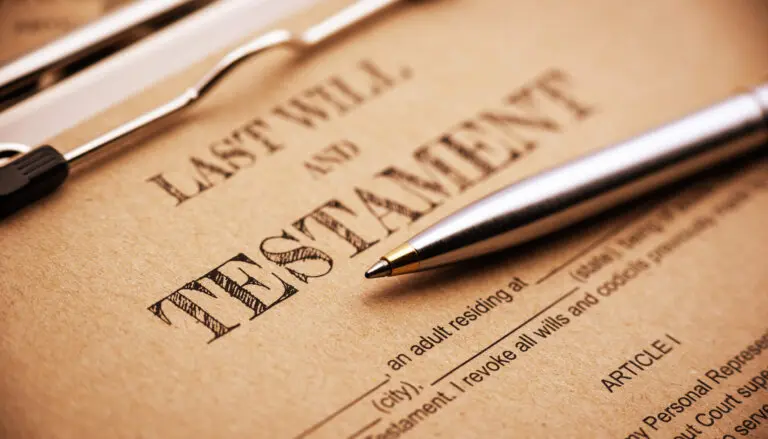Overview of the Probate Process in Massachusetts
The probate process in Massachusetts settles a deceased person’s estate by validating their will, paying debts and taxes, and distributing assets. Massachusetts offers several types of probate: formal, informal, late and limited. Each type varies in complexity and requirements, but all ensure the estate is managed according to state laws and the decedent’s wishes.
Purpose and Function of Probate
The primary purpose of probate is to ensure that a deceased person’s estate is managed and distributed according to their wishes, as outlined in their will, or according to state law if no will exists. While a will can facilitate probate by providing clear instructions for asset distribution, it does not replace the probate process. The court must still validate the will to confirm its authenticity and oversee the process of settling the estate.
Probate also establishes a legal framework for identifying and valuing the decedent’s assets, paying any outstanding debts and taxes, and distributing the remaining property to beneficiaries or heirs. By providing structure and legal oversight, probate helps maintain order, ensures compliance, and protects the rights of all parties involved.
Types of Probate in Massachusetts
Massachusetts has three types of probate: informal, formal, and late and limited.
Informal Probate
Informal probate is a streamlined process in Massachusetts designed for relatively straightforward and uncontested estates. It allows for quicker and less expensive administration than formal probate, making it a preferred option when all parties agree on the distribution of assets. Key aspects of informal probate include:
- Simplified Process: The personal representative (executor) is appointed without the need for a court hearing, as long as the paperwork is correctly filed and no objections are raised.
- Limited Court Supervision: Unlike formal probate, informal probate involves minimal court oversight, allowing the personal representative more autonomy to manage and distribute the estate.
- Time Efficiency: Informal probate typically moves faster because it avoids lengthy court procedures and hearings.
- Requirements: To qualify, the decedent must have left a will with clear instructions, and all interested parties must agree to the process. Any disputes may require transitioning to formal probate.
Informal probate offers a more efficient route for families seeking a quick resolution while keeping legal costs manageable.
Formal Probate
Formal probate is a more structured and supervised process in Massachusetts, used when there are complexities in the estate or disputes among interested parties. It involves greater court oversight. Key aspects of formal probate include:
- Court Supervision: The court plays an active role, overseeing the appointment of the personal representative and ensuring the proper administration of the estate.
- Court Hearings: Formal probate requires at least one court hearing, during which the will is validated, and any objections or disputes are addressed. Multiple hearings may be necessary if conflicts arise.
- Suitable for Complex Estates: This process is appropriate when the estate involves significant assets, complex property holdings, or unclear terms in the will.
- Handling Disputes: Formal probate provides a platform for resolving disputes among heirs, creditors, or other interested parties, offering a legally binding resolution.
While more time-consuming and costly, formal probate ensures thorough and transparent management of an estate, protecting the interests of all involved parties.
Late and Limited Probate
Late and limited formal probate in Massachusetts applies when no probate proceedings have taken place within three years of the decedent’s death. In this process, the court may accept a petition to either admit the will to formal probate or determine heirs if no will exists. Once the court validates the will or identifies heirs, a personal representative is appointed to manage the estate. However, their authority is limited—they can confirm ownership of assets but cannot sell the decedent’s real estate.
Steps in the Probate Process
At Surprenant, Beneski & Nunes, we not only help clients plan their estates and prepare their wills, but we also help to make probate simple for clients who have assumed the role of personal representative for a relative or close friend. The probate process involves the following steps:

Filing a Petition
A petition must be filed with the local probate court to admit the will to probate and appoint the personal representative or, if there is no will, appoint an estate administrator.
Notification of Interested Parties
Next, notice must be given to all beneficiaries under the will or to statutory heirs (if no will exists). This part of the process often involves a publication in a local newspaper to alert potential creditors to the deceased’s passing.
Appointment of Personal Representative
The appointment of a personal representative, also known as an executor or administrator, is a critical step in the probate process. This individual is designated by the court to manage the decedent’s estate, including gathering assets, paying debts and taxes, and distributing property to heirs or beneficiaries.
Inventory of the Estate
The personal representative must take a complete inventory of the estate, including all bank accounts, investments, real estate, retirement accounts, vehicles, artwork, jewelry, antiques, and collections. All of these assets must be recorded and, when necessary, professionally appraised. The full inventory report must be submitted to the court.
Payment of Estate Debts and Taxes
The deceased person’s outstanding obligations or debts must be paid off from the estate’s funds.
Distribution of the Remaining Assets
Once all debts, taxes, and administrative costs have been paid, the remaining assets must be distributed to the heirs and other designated beneficiaries.
Closing the Estate
The last step of the probate process is providing the court with a final report of the estate.
Key Players in the Probate Process
The probate process in Massachusetts involves several key players, each playing an important role in settling the estate and distributing assets according to the decedent’s wishes or state law.
- Decedent: The person who has passed away, leaving behind an estate that needs to be managed and distributed. The decedent may or may not have left a will outlining their wishes for asset distribution.
- Personal Representative: Also known as the executor (if named in a will) or administrator (if appointed by the court when no will exists). This individual is responsible for managing the estate, including paying debts, filing taxes, and distributing assets.
- Beneficiaries: Individuals or entities designated to receive assets from the decedent’s estate, either named in the will or determined by state intestacy laws if no will exists.
- Creditors: Individuals or businesses to whom the decedent owed money. They must be notified and given the opportunity to file claims against the estate.
- Probate Court: Oversees the probate process, ensuring legal compliance, validating the will, resolving disputes, and appointing a personal representative when necessary.

What Happens If You Die Without a Will?
If you die without a will in Massachusetts, your estate is considered “intestate,” meaning that the distribution of your assets will be determined by state law rather than your personal wishes. Massachusetts intestacy laws provide a specific hierarchy for dividing assets, typically prioritizing spouses, children, and other close relatives.
Without a will, you lose control over critical aspects of your estate, such as selecting a guardian for minor children or choosing a trusted individual to manage your estate. The court appoints an administrator to handle your estate, but this can lead to delays, additional legal expenses, and potential disputes among family members, all of which can complicate the probate process.
Massachusetts Intestacy Laws and Distribution Hierarchy
Massachusetts intestacy laws govern how a person’s assets are distributed if they pass away without a will. The distribution hierarchy prioritizes close relatives, with specific shares allocated based on family structure. The primary beneficiaries in intestate succession are typically the surviving spouse and children, but other relatives may inherit if these primary relatives are not present.
Key points of Massachusetts intestacy distribution include:
Surviving Spouse
- If there are no children or parents of the decedent, the spouse inherits the entire estate.
- If there are children from the marriage, the spouse also inherits the full estate.
- If there are children from a previous relationship, the spouse receives $100,000 plus half of the estate, with the remaining half going to the decedent’s children.
- If there are parents but no children, the spouse receives $200,000 plus three-fourths of the balance of the estate, and the parents inherit what remains.
Children
If there is no surviving spouse, the decedent’s children inherit the estate equally.
Parents and Siblings
If the decedent has no spouse or children, the estate goes to the parents. If the parents are deceased, siblings inherit the assets equally.
Massachusetts intestacy laws ensure an orderly distribution if there is no will. Still, the court’s decision may not align with the decedent’s specific wishes, which is why having a will remains essential.
Strategies for Avoiding Probate in Massachusetts
Avoiding probate can help reduce delays, costs, and public exposure of one’s estate. In Massachusetts, several strategies can keep assets out of probate, allowing for a smoother transition to heirs and beneficiaries. Key methods include:
- Living Trusts: Assets placed in a living trust do not go through probate. The grantor transfers property into the trust and names a trustee who manages the assets for the beneficiaries. Upon the grantor’s death, assets in the trust pass directly to beneficiaries without court involvement.
- Joint Ownership with Rights of Survivorship: Property jointly owned with rights of survivorship automatically transfers to the surviving owner(s) when one owner dies. Commonly used for real estate and bank accounts, this method bypasses probate for the jointly held assets.
- Payable-on-Death (POD) and Transfer-on-Death (TOD) Designations: Adding POD or TOD designations to bank accounts or securities allows these assets to transfer directly to named beneficiaries upon death, skipping probate.
- Gifting Assets During Your Lifetime: By gifting assets while alive, you can reduce the size of your estate and, therefore, the assets subject to probate. This also allows you to see your beneficiaries benefit from your gifts.
- Life Insurance Policies: Proceeds from life insurance policies go directly to the named beneficiaries and are not subject to probate, making them an efficient way to provide for loved ones.
- Retirement Accounts with Named Beneficiaries: Retirement accounts, such as IRAs and 401(k)s, can also avoid probate if beneficiaries are designated, allowing for a direct transfer upon death.
Using these strategies can simplify estate administration and offer peace of mind that loved ones will receive their inheritance without the delays and costs of probate.
FAQs About Probate
What is the average duration of the probate process in Massachusetts?
The average duration of the probate process in Massachusetts typically ranges from 9 to 12 months, depending on the complexity of the estate, any disputes, and the court’s caseload. Larger or contested estates may extend beyond this timeframe, while straightforward cases can be resolved more quickly.
How much does the probate process typically cost?
The cost of probate in Massachusetts varies based on estate size and complexity but generally includes court fees, attorney fees, and administrative expenses. For straightforward estates, costs may be a few thousand dollars, while complex or contested estates can reach tens of thousands.
Can probate be avoided if there's a will?
No, having a will does not avoid probate. A will directs how assets should be distributed, but it must still go through probate for validation. However, using tools like living trusts, joint ownership, and beneficiary designations can help bypass probate for certain assets.

What are the duties of a personal representative?
A personal representative’s duties include managing the decedent’s estate by locating and valuing assets, paying outstanding debts and taxes, and distributing assets to beneficiaries according to the will or state law. They also handle court filings and maintain transparent records throughout the probate process.
What if there's a dispute about the will or distribution of assets?
If there is a dispute regarding the will’s validity or the distribution of assets, interested parties can contest the will or file objections with the probate court. This will prolong the probate process as the court will intervene to resolve the dispute.
Is probate necessary for all types of assets?
Not all assets require probate in Massachusetts. Assets with designated beneficiaries (like life insurance policies or retirement accounts with named beneficiaries) and assets held in trust typically pass outside of probate, as does jointly owned property with rights of survivorship.
What happens if the will is deemed invalid?
If a will is deemed invalid in Massachusetts (for reasons such as lack of proper execution, undue influence, or incapacity of the deceased), the estate will be distributed according to the state’s intestacy laws as if there were no will, and the probate court will oversee the process.
How Surprenant, Beneski & Nunes Will Help You Navigate Probate
When it comes to navigating the probate process, Surprenant, Beneski & Nunes provides the trusted guidance and comprehensive legal services you need. Whether you’re engaging in estate planning, updating essential documents, or acting as a personal representative, our firm offers the skilled, empathetic representation you deserve.
Having a committed attorney by your side is invaluable when it comes to complying with Massachusetts probate law while advancing your and your family’s interests. Our team will efficiently guide you through probate, ensuring you feel informed and supported at each step. Here’s how we can help:
Experienced Guidance and In-Depth Legal Knowledge
With decades of combined experience, our attorneys understand the nuances of Massachusetts probate law. We’ll help you navigate every phase of probate, from initial filings to final asset distribution, ensuring all documents are precisely prepared and submitted, minimizing delays and disputes.
Customized Estate Planning Solutions
Our attorneys collaborate closely with you to create estate plans tailored to your unique goals. We ensure your plan includes essential elements, helping to streamline or even avoid probate while minimizing potential complications.
Executor and Administrator Assistance
We bring a wealth of experience to estate administration, supporting you in fulfilling your role as executor or administrator with confidence. Our team will help manage assets, pay taxes and debts, and distribute property in accordance with the decedent’s wishes or state intestacy laws, ensuring legal compliance throughout.
Comprehensive and Compassionate Probate Services
We handle all probate-related tasks, including asset valuation, creditor notifications, tax filings, and final distributions. Recognizing the emotional toll probate can take, our team provides compassionate support while handling all legal and administrative needs, ensuring your family’s experience is as smooth as possible.
Contact Surprenant, Beneski & Nunes’s Accomplished Probate Attorneys Today
Throughout the probate process, our attorneys will provide you with clear explanations of complex legal concepts. At the same time, we will highlight the rights and responsibilities inherent in managing an estate. Our goal, in matters of probate as in all aspects of estate planning, is to empower and support you. Contact us now to experience the confidence that comes from working with dedicated, caring professionals.

